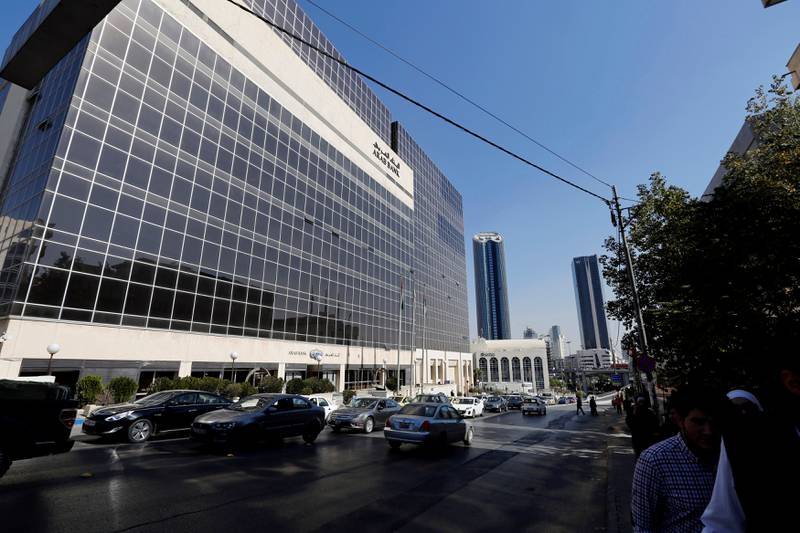Jordan’s Arab Bank records 38% increase in half-year net profit to $252m

Arab Bank, Jordan’s biggest lender, reported a 38 per cent increase in half-year net income of $252 million compared with $182.4m for the same period last year amid an increase in loans, deposits, net interest and commission income.
The lender’s loan portfolio grew by 6 per cent to reach $35.7 billion as of June 30 compared with $33.8bn for the same period last year, it said on Saturday. Customer deposits increased 2 per cent to reach $47.1bn, compared with $46bn for the same period last year, the bank said.Read More : Saudi crown prince visits Egypt ahead of Biden's Mideast trip The results reflect the bank’s “prudent operating policies and strong financial position, despite a challenging economic environment”, Sabih Masri, chairman of the board of directors, said.
The global economy has weakened in the second quarter of this year as rising inflation has forced most central banks to aggressively raise interest rates. Market volatility amid the continuing conflict in Ukraine, supply chain disruptions, the slowing Chinese economy and high energy prices have added to global headwinds.
Earlier this week, the International Monetary Fund lowered its growth forecast for the global economy for the second time this year. The IMF now projects global growth at 3.2 per cent in 2022 and 2.9 per cent in 2023, revising it down 0.4 and 0.7 percentage points from its April forecast, respectively.
The fund gave a warning that if further risks materialise and inflation continues to rise, global growth could decline to about 2.6 per cent and 2 per cent in 2022 and 2023, respectively, which would put growth in the bottom 10 per cent of outcomes since 1970.
The rebound in the Jordanian economy has helped to improve operating conditions for the country’s financial institutions and continues to support the banking sector’s stable outlook, Moody’s Investors Services said in a report this week.
Strong capital buffers, ample deposit funding and liquidity buffers also bode well for the financial stability of banks in the kingdom, the rating agency added. The ratings agency expects the Jordanian economy to expand between 2.5 per cent and 3 per cent in 2022 and 2023, respectively.
Despite the challenging circumstances, sound policies have contributed to macroeconomic stability and the IMF expects Jordan’s gross domestic product to expand by about 2.4 per cent in 2022, lower than an earlier 2.7 per cent estimate, the fund said in May.
Arab Bank recorded a 6 per cent growth in net operating income across its lines of business, driven by improvements in both net interest income and commission income, by 4 per cent and 17 per cent respectively, the lender’s chief executive Randa Sadik said.
The company enjoys high liquidity and a strong capital base with a loan-to-deposit ratio of 75.9 per cent and a capital adequacy ratio of 16.4 per cent, Ms Sadik added.
The bank holds credit provisions against non-performing loans in excess of 100 per cent, she said. Arab Bank maintained its strong capital base with total equity of $10.2bn. Last year, the bank launched Reflect, the first neobank in Jordan, which provides branchless services to millennials through its app.
The lender’s loan portfolio grew by 6 per cent to reach $35.7 billion as of June 30 compared with $33.8bn for the same period last year, it said on Saturday. Customer deposits increased 2 per cent to reach $47.1bn, compared with $46bn for the same period last year, the bank said.
The global economy has weakened in the second quarter of this year as rising inflation has forced most central banks to aggressively raise interest rates. Market volatility amid the continuing conflict in Ukraine, supply chain disruptions, the slowing Chinese economy and high energy prices have added to global headwinds.
Earlier this week, the International Monetary Fund lowered its growth forecast for the global economy for the second time this year. The IMF now projects global growth at 3.2 per cent in 2022 and 2.9 per cent in 2023, revising it down 0.4 and 0.7 percentage points from its April forecast, respectively.
The fund gave a warning that if further risks materialise and inflation continues to rise, global growth could decline to about 2.6 per cent and 2 per cent in 2022 and 2023, respectively, which would put growth in the bottom 10 per cent of outcomes since 1970.
The rebound in the Jordanian economy has helped to improve operating conditions for the country’s financial institutions and continues to support the banking sector’s stable outlook, Moody’s Investors Services said in a report this week.
Strong capital buffers, ample deposit funding and liquidity buffers also bode well for the financial stability of banks in the kingdom, the rating agency added. The ratings agency expects the Jordanian economy to expand between 2.5 per cent and 3 per cent in 2022 and 2023, respectively.
Despite the challenging circumstances, sound policies have contributed to macroeconomic stability and the IMF expects Jordan’s gross domestic product to expand by about 2.4 per cent in 2022, lower than an earlier 2.7 per cent estimate, the fund said in May.
Arab Bank recorded a 6 per cent growth in net operating income across its lines of business, driven by improvements in both net interest income and commission income, by 4 per cent and 17 per cent respectively, the lender’s chief executive Randa Sadik said.
The company enjoys high liquidity and a strong capital base with a loan-to-deposit ratio of 75.9 per cent and a capital adequacy ratio of 16.4 per cent, Ms Sadik added.
The bank holds credit provisions against non-performing loans in excess of 100 per cent, she said. Arab Bank maintained its strong capital base with total equity of $10.2bn. Last year, the bank launched Reflect, the first neobank in Jordan, which provides branchless services to millennials through its app.
Source: www.thenationalnews.com
